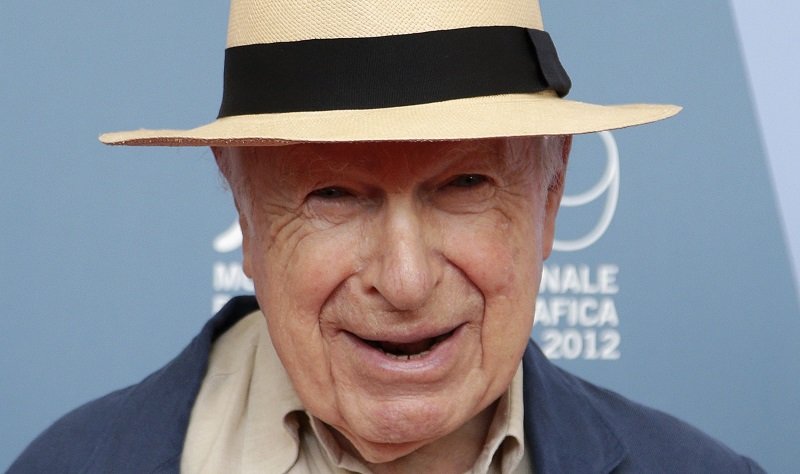
Director and writer Peter Brook poses during the photocall of the movie “The Tightrope” at the 69th Venice Film Festival in Venice September 5, 2012.
17:54 JST, July 6, 2022
Peter Brook, a visionary English theater director who staged groundbreaking productions on both sides of the Atlantic, helping to demonstrate his belief that the trappings of conventional theater – the red curtain, the music, the costumes, the spotlight – were inessential to the art form, died July 2 in Paris. He was 97.
His son, Simon, said he had been in declining health but did not give a specific cause.
Brook was a towering figure in international theater, widely described as the most influential director of his generation, if not of the late 20th century. His work ranged from the minimalist to the grandiose, from a stripped-down staging of Bizet’s opera “Carmen” to a nine-hour adaptation of the Sanskrit epic the “Mahabharata,” which he originally staged at a limestone quarry complete with an artificial lake.
Theater critics noted that he had aspects of a shaman as well as a showman, searching for spiritual truth through his art and his travels across Asia and Africa, even as he kept an eye on his box-office earnings. Slender and balding, he had a craggy face that seemed to suggest the look of an oracle, and he cited the Russian Armenian mystic George Gurdjieff as a key influence, noting the spiritual teacher’s insistence on questioning everything.
“Taste, test, question and never reach a conclusion,” Brook told the New York Times.
In his directorial career, that meant bouncing between artistic forms and genres, looking for new ways to delight, provoke and unsettle audiences. “I have really spent all of my working life in looking for opposites,” he once said.
Brook bridged the worlds of commercial and experimental theater, directing canonical works by Shakespeare and Chekhov, modernist plays by Samuel Beckett and Jean Cocteau, and romantic comedies and musicals such as “Irma La Douce,” which played for three years on London’s West End and became a Broadway hit in 1960.
He won Tony Awards in 1966 and 1971, respectively, for directing Peter Weiss’s brutal drama “Marat/Sade” and a pared-down, white-box production of Shakespeare’s “A Midsummer Night’s Dream.” The latter featured actors spinning plates and swinging on trapeze and ended with the cast leaving the stage to shake hands with the audience.
Brook also directed operas and films, including a popular 1963 screen adaptation of William Golding’s novel “Lord of the Flies,” about schoolboys marooned on an island, and a bleak 1971 adaptation of “King Lear,” starring Paul Scofield.
A pioneer of gender- and colorblind casting (he preferred the term “color-rich”), Brook worked with many of the leading actors of his era, including John Gielgud, Alec Guinness, Glenda Jackson, Vivien Leigh, Laurence Olivier and Orson Welles. For one of his first productions, a staging of “Hamlet” that he performed for his parents on a toy stage at age 10, he simply used cutout figures, reading the lines himself.
By his mid-20s, he was directing plays in Birmingham, Stratford and London, where he acquired a reputation as a prodigy – “a superconfident, baby-faced wonder boy who likes to shock,” as Time magazine put it in 1949. His early productions included elaborate stagings of costume dramas such as “Ring Round the Moon” and comedies like “The Little Hut,” although by the mid-1950s, he had begun working to trim, simplify and purify his work.
At times he called himself a “distiller” rather than a “director.” “Simple, pure, simple,” he would say.
As Brook continued to experiment, he set down his theories in lectures and books such as “The Empty Space” (1968). “I can take any empty space and call it a bare stage,” he began. “A man walks across this empty space whilst someone else is watching him, and this is all that is needed for an act of theatre to be engaged.”
Proving his point, he mounted international touring productions that could be performed outdoors, often with rugs serving as a stage.
The vehicle for his theatrical explorations became the International Center for Theater Research (also known by its French acronym, CIRT), which he founded after moving to Paris in 1970. For decades, he worked there with his chief lieutenant, Marie-Hélène Estienne, staging classics like Chekhov’s “The Cherry Orchard” while also working on new productions such as his adaptation of the “Mahabharata,” a key Hindu text and foundation work of South Asian literature.
Developed over a decade with his collaborator Jean-Claude Carrière, the play premiered at the Avignon Festival in France in 1985. “Mr. Brook, synthesizing all his previous theatrical inventions, did nothing less than attempt to transform Hindu myth into universalized art, accessible to any culture,” theater critic and journalist Margaret Croyden wrote in the Times.
The play featured a cast of 21 actors from 16 countries and toured the world for four years. But it also prompted a backlash from scholars and critics who accused Brook of appropriating Indian culture. “He has taken one of our most significant texts,” wrote Indian author and theater director Rustom Bharucha, “and decontextualised it from its history in order to sell it to audiences in the west.”
Brook acknowledged that the play “would never have existed without India” but defended his interpretation of the text, returning to the source material in 2016 with “Battlefield,” a four-character play that he directed and wrote with Estienne. As he told it, his “Mahabharata” was an effort to present art that appealed to audiences around the world, regardless of their background.
“When we did it, Indians said, ‘Here you are, colonialists, stealing our heritage,’ ” he told the Times in 2019. “I said, ‘No, it belongs to the world.’ And I know that you have little companies all over India who do Shakespeare. Has anyone ever said, ‘This belongs to England?'”
Peter Stephen Paul Brook was born in London on March 21, 1925. His parents were Jewish immigrants from Eastern Europe who worked as chemists, running a company that developed a popular chocolate-flavored laxative called Brooklax.
As a boy, Brook dreamed of becoming a foreign correspondent, viewing journalism as an escape from what he considered the dreary world of middle-class London. Decades later, he explained his wanderlust – and his decision to move from England to France – by quoting one of his favorite Shakespeare lines: “There is a world elsewhere,” from “Coriolanus.”
While studying at Magdalen College at the University of Oxford, he staged plays including Christopher Marlowe’s “Doctor Faustus,” recruiting the aging occultist Aleister Crowley to advise the cast on the practice of magic.
After graduating in 1944 at age 20, he filmed advertising shorts and worked on a production of George Bernard Shaw’s “Pygmalion” that was intended for troops overseas. Liverpool theater director William Armstrong saw him running a dress rehearsal and helped kick-start Brook’s career by recommending him to the Birmingham Repertory, where Brook made his debut in 1945 directing Shaw’s “Man and Superman.”
He was soon directing operas at Covent Garden in London, including a 1949 staging of Richard Strauss’s “Salome” that featured sets and costumes by Salvador Dalí.
By 1953, he had arrived in New York City, where he directed a production of Gounod’s “Faust” for the Metropolitan Opera, moving the action from the 16th to the 19th century. That same year, he directed his first film, “The Beggar’s Opera,” the rare musical to star Olivier. It flopped at the box office, and Brook later struggled to find a wide audience for movies such as “Seven Days . . . Seven Nights” (1960).
Working on movies, he was at the mercy of studio executives and budget constraints, he said, while “in the theater you can evoke a universe in an empty space.”
Brook was named commander of the Order of the British Empire in 1965 and Companion of Honor in 1998. He received Norway’s inaugural International Ibsen Award in 2008 and India’s Padma Shri in 2021.
In 1951, he married actress Natasha Parry, who went on to appear in many of his productions. She died in 2015. In addition to his son, a filmmaker, survivors include a daughter, Irina Brook, a theater and opera director; and two grandchildren.
Brook stepped down as artistic director of the CIRT in 2011 but was still working in recent years, even as macular degeneration made it difficult for him to see. In 2019 he premiered a new play, “Why?,” about experimental Russian director Vsevolod Meyerhold, which Brook wrote and staged with Estienne.
“The one truth is that theater is a living experience,” he told the London Evening Standard that year. “As long as it’s alive, it’s alive. It fluctuates and changes. If we work in that form or write about it, we have a responsibility to not let the flame go out.”
Top Articles in News Services
-

Prudential Life Expected to Face Inspection over Fraud
-

Hong Kong Ex-Publisher Jimmy Lai’s Sentence Raises International Outcry as China Defends It
-

Japan’s Nikkei Stock Average Touches 58,000 as Yen, Jgbs Rally on Election Fallout (UPDATE 1)
-

Survey Shows False Election Info Perceived as True
-

Trump Names Former Federal Reserve Governor Warsh as the Next Fed Chair, Replacing Powell
JN ACCESS RANKING
-

Japan PM Takaichi’s Cabinet Resigns en Masse
-

Japan Institute to Use Domestic Commercial Optical Lattice Clock to Set Japan Standard Time
-

Israeli Ambassador to Japan Speaks about Japan’s Role in the Reconstruction of Gaza
-

Man Infected with Measles May Have Come in Contact with Many People in Tokyo, Went to Store, Restaurant Around When Symptoms Emerged
-

Prudential Life Insurance Plans to Fully Compensate for Damages Caused by Fraudulent Actions Without Waiting for Third-Party Committee Review


















